Russia strikes Ukraine in a strong missile attack that killed more than 30 people and hit a pediatric hospital in Kiev International
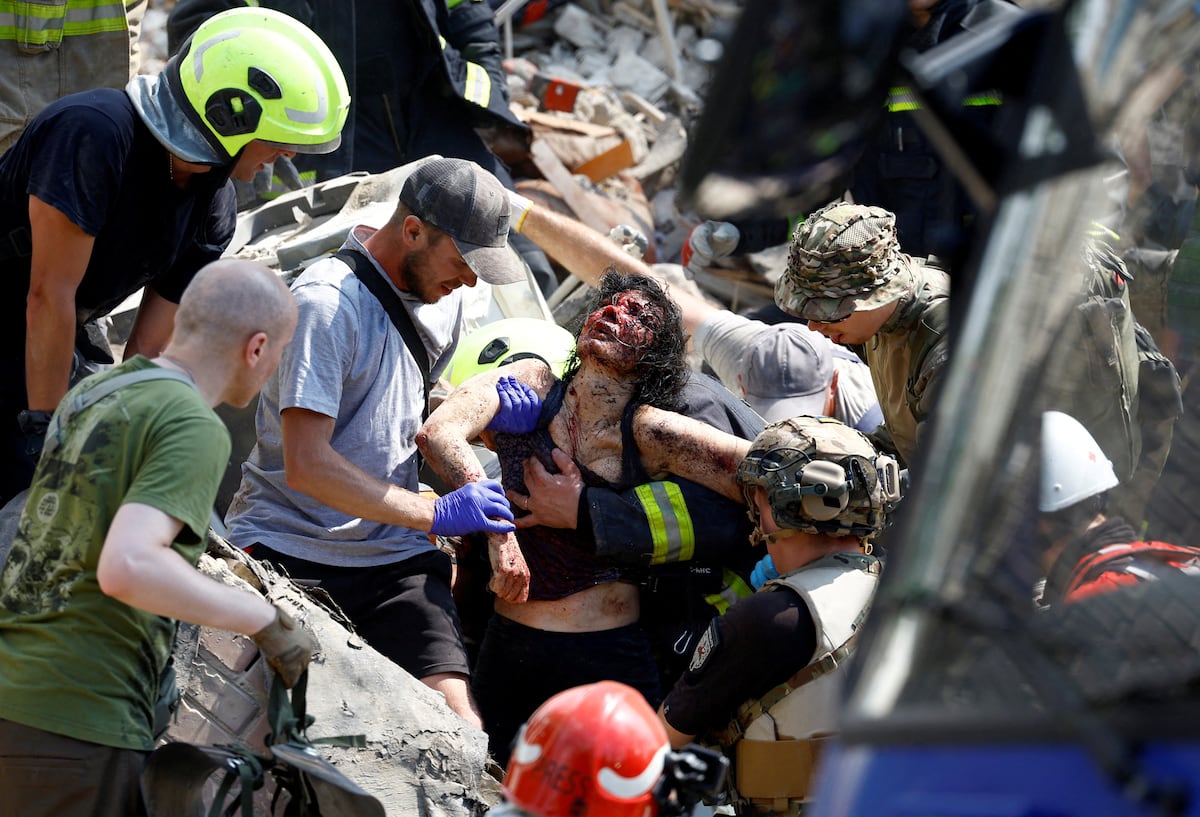
More than 28 months after the full-scale invasion of Ukraine began, Russia has once again used one of its deadliest tactics: attacking civilians. This Monday at around 10:00, a wave of missiles from the eastern and southern sides of the border with Russia rushed towards Ukraine and struck several points in the country, with particular intensity in Kiev. According to the latest provisional balance provided by the Ministry of the Interior, at least 2022 people have been killed in the Ukrainian capital in one of the worst attacks in the memory of the city since the start of the war in February 23. There are now more than thirty people dead across the region, and more than a hundred injured. One of the places affected in Kiev was the Ozmatdit pediatric hospital, which had to be evacuated immediately. “It is important that everyone sees what (Russia) is doing,” Ukrainian President Volodymyr Zelenskyy said in a message on his social networks accompanied by a video showing the damage to the children’s health center.
Even several hours after the missiles fell on the capital, ambulances and emergency teams were working in the city to reach the impact sites. Plumes of smoke could still be seen at noon in some of the affected districts, such as Solomiansky, very close to the Pasazhirsky train station, or Shevchenkivsky, next to the Lukianivska metro station and where Russian ammunition belonging to a well-known Ukrainian company was blown up. In a combined attack of cruise missiles, ballistic missiles and guided bombs, the aggressor has struck the heart of the country on the eve of the NATO meeting in Washington, in which its 75th anniversary will be celebrated and in which Kiev hopes to receive new guarantees of future joining the alliance, a move that the Kremlin categorically rejects.
Zelensky, who arrived in Warsaw this Monday to sign a security agreement with Polish Prime Minister Donald Tusk, has described the attack as “terrorist” and estimated that 40 missiles fell on the country this Monday. “Now that the (Ozmatadit) hospital is damaged by the Russian attack, there are people under the rubble and the exact number of victims is still unknown,” the leader said, adding, “Russia cannot claim ignorance about where its weapons are flying. It must be held fully responsible for the missiles and all its crimes.” At the request of the United Kingdom, France, Ecuador, Slovenia and the United States, the United Nations Security Council will hold a meeting this Tuesday on this latest Russian attack.
This is not the first time in recent days that Russia has targeted the Ukrainian capital. On this occasion, and despite the security work, Russian shells reached the Ozmatdit Pediatric Hospital in Shevchenkivskyi, a few kilometers from the center of Kiev, in broad daylight, damaging it inside and outside. These facilities, which occupy an entire block, are among the best in the country in terms of child health. According to a fire brigade spokesman, two people have died in the attack, at least one of them a health worker, and another 15 have been injured.
A few meters from the entrance, while volunteers and emergency teams worked to remove the remains of a building shattered by a missile’s blast wave, 29-year-old Oleksandr Istomin, a paediatric hematology department worker, showed in a video recorded by himself how the room he was in had become. “I’m lucky, that’s all,” he said, pointing with his finger to the room he was in when, at ten o’clock in the morning, after several explosions nearby, a missile fell next to the intensive care area. A window slid inward and could have fallen on them. “Yes, I feared for my life,” he said, adding, “one cannot ignore such a thing.” This centre employee estimates that more than a thousand children were admitted to Ozmatdet, to which hundreds of workers must be added. “If this is Russia’s new strategy, what will happen next?” Istomin asked himself with clear signs of fatigue and frustration.
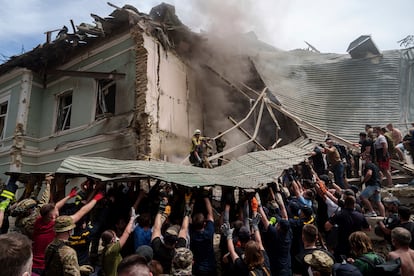
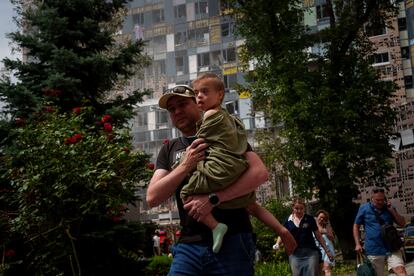
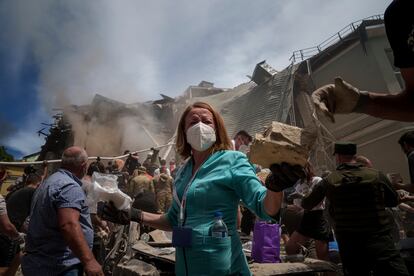
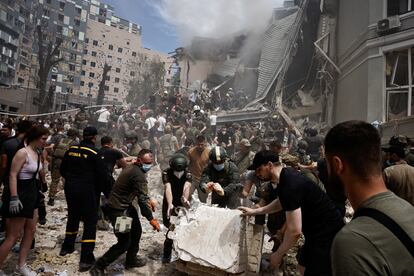
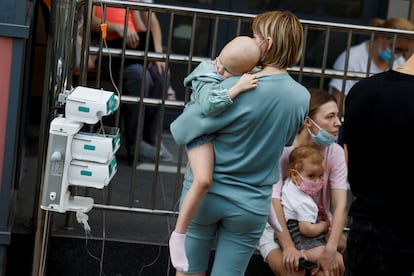
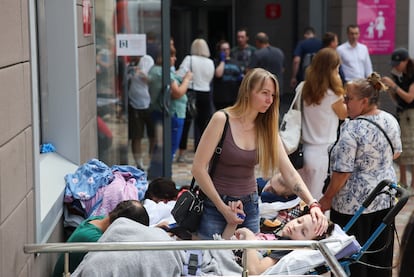
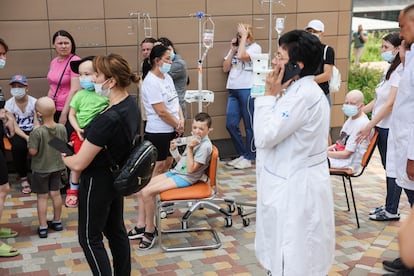
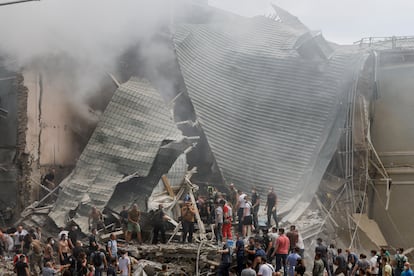
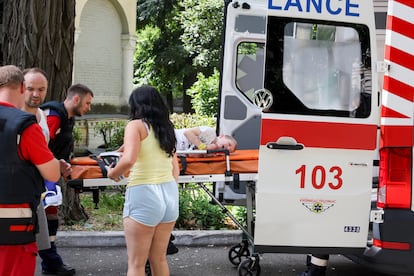
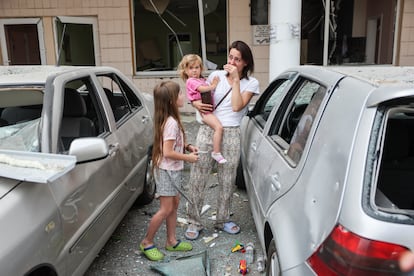
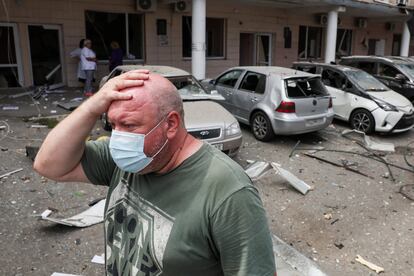
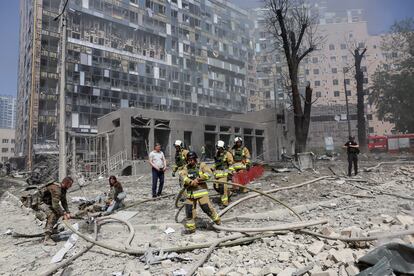
To know what happens outside is to understand what will happen inside, don’t miss anything.
keep reading
The photos inside, taken by personnel recording the moments after the attack, and the images left by the exterior, which shows a destroyed façade and an adjacent building practically collapsed, are Dantesque. Photojournalists who arrived during the hospital evacuation have managed to capture pictures of many wounded and bloodied minors under the supervision of health workers. Dozens of people, including the center’s volunteers, emergency workers and health workers, worked to remove the material in good condition. Next to an incubator, Irina Safronova, 60, was running from side to side, tearing her hair. He works in the anesthesia department. “I was inside the building and everything fell on me,” he said, touching some scratches on his face. He rushed out, throwing everything on his mind. “Our luck is that we had just evacuated the children from the intensive care area and the missile fell there,” he added.
“This is one of the most terrible attacks,” said the city’s mayor Vitali Klitschko. “You can see: this is a children’s hospital.” Klitschko, who visited Ozmatdit early in the morning, reported that the patients of this center, children, were transferred to other public facilities.
To the deaths in Kiev we must add, still in the provisional balance, at least 11 dead in Krivoy Rih in central Ukraine and three more dead in Pokrovsk, in the eastern strip, near the front line. Civilian areas of Dnipro, Sloviansk and Kramatorsk have also been shelled. The Russian Defense Ministry, consistent with what it has said since the beginning of the invasion after each bombing, has defended, perhaps bordering on dialectical absurdity, that its forces had carried out attacks against defense industry targets and aviation bases in Ukraine. “The objectives have been achieved,” the department led by Andrei Belousov said in a statement. The Ukrainian prosecutor’s office has reported that it will send evidence collected after the attack this Monday to the International Criminal Court in The Hague for investigation into possible war crimes or crimes against humanity.
The UN Humanitarian Office for the Emergencies (OCHA) has issued a message of condemnation against the Russian bombing. “The unacceptable airstrikes that damaged the children’s hospital in Kiev this Monday are another example of the terrible consequences of Russian aggression for the civilian population of Ukraine,” said its in-country coordinator Denis Brown. “Thousands of hospitals, health centres and clinics have been damaged over the past two years. Health care facilities enjoy special protection under international humanitarian law because they save lives. Hospitals must be protected.”
Before the bombing on Monday morning, Moscow had attacked the Yhytomyr and Cherkasy provinces in the center of the country, without causing any fatalities or damage. The Russian attack has devastated a population exhausted after more than two years of war, badly affected by power cuts caused by systematic bombing of power plants―Ukraine has lost half of the energy it produced just a few months ago, leading to blackouts in newspapers throughout the country―, and with problems both in supplying ammunition to the front and in mobilizing people for war.
Follow all international updates Facebook And Xor in Our weekly newsletter,
Subscribe to continue reading
Read without limits
,
(TagstoTranslate)Russian war in Ukraine